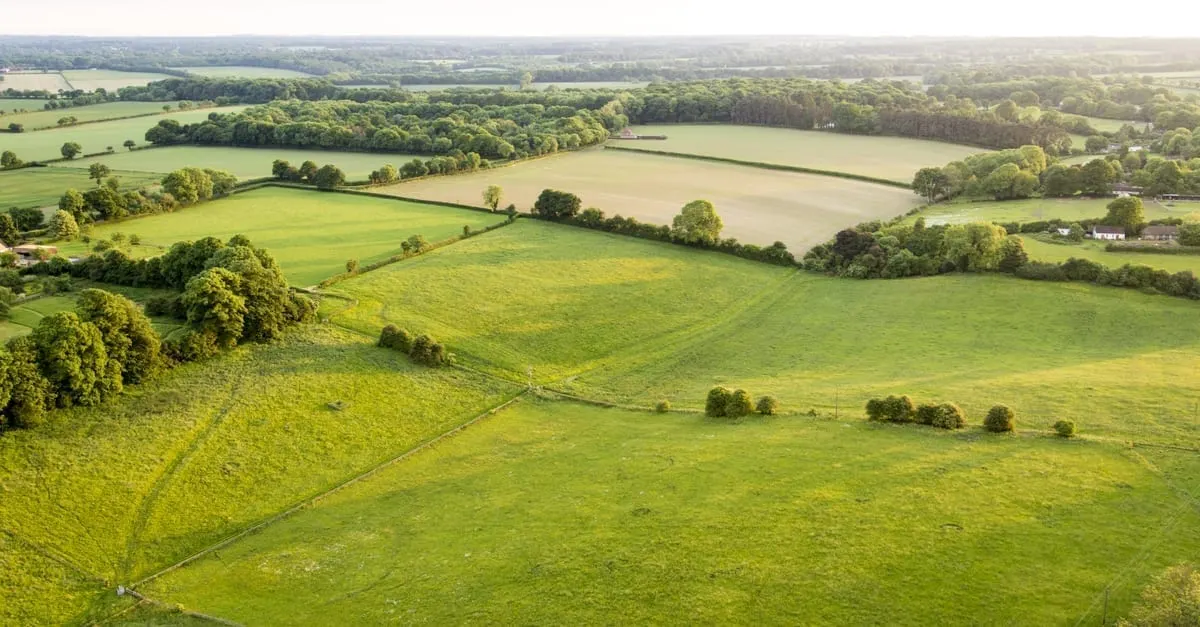If you own property, you may be asking, “How much is my land worth?” Don’t worry; we’ve built this article to answer this exact question.
Read on to learn how to determine the value of your land to make sure you know exactly what it’s worth.
How Much Is My Land Worth?
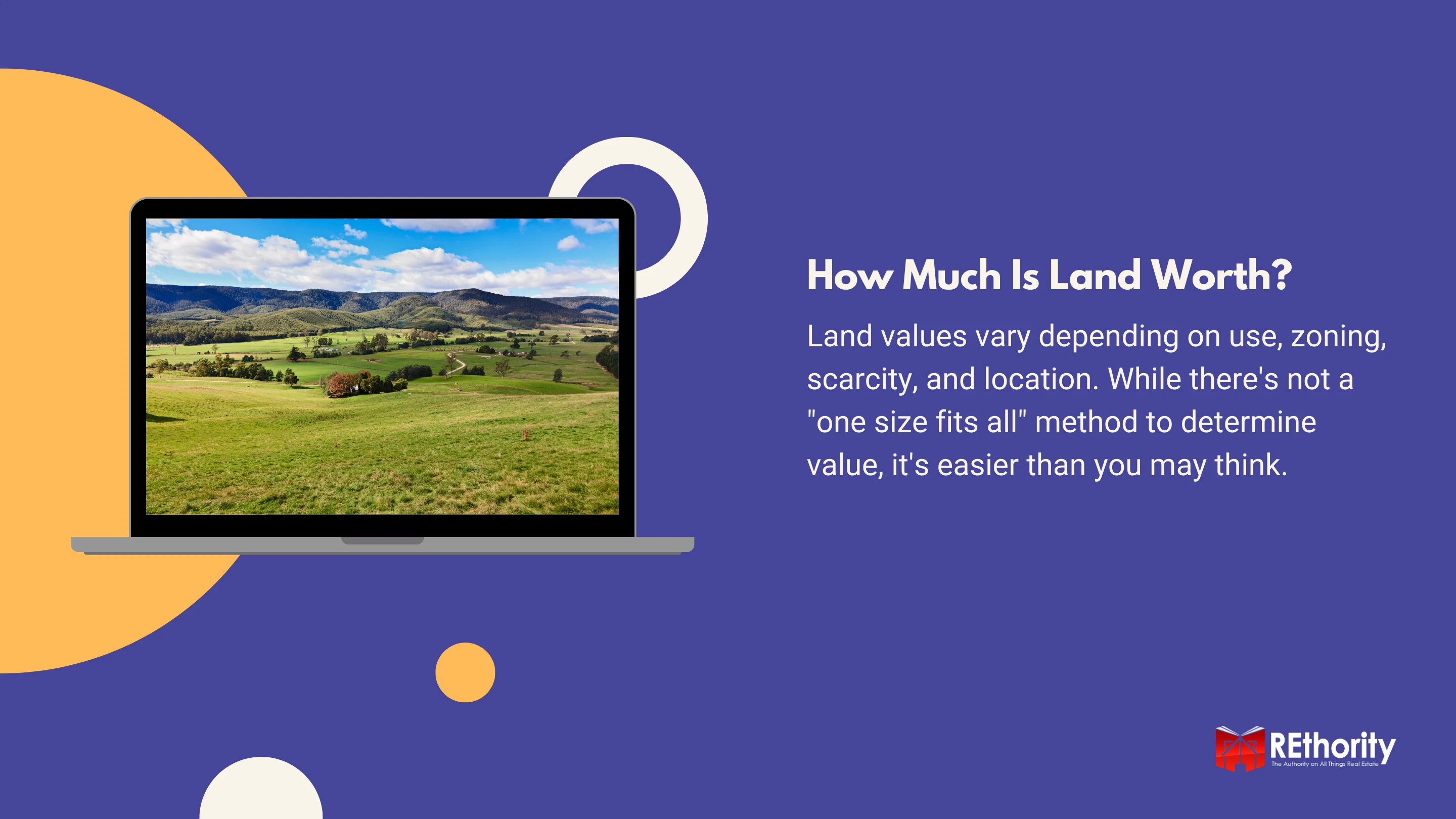
If you own unimproved land, it’s essential to know what the land is worth. Having some idea of value may be essential if you want to sell or use the property as security for a loan.
Owners of vacant lots and other empty land are no different from any homeowner or real estate investor. Unfortunately, valuing vacant land is different.
It’s harder to value unimproved land than it is to value residential or commercial property with buildings. The tried-and-true methods customarily used to determine real estate value each have problems with land value.
Traditional Valuation
There are three main ways of valuing real estate. Each can only be applied to a limited extent when it comes to unimproved land, however. Here are the three:
1. Sales Comparisons
This method is familiar to any homeowner who’s sat through a market analysis presentation from a real estate agent. It looks at the sale price paid for recent sales of nearby properties. Then it uses those to produce an estimate of the home value for listing purposes.
With vacant land, comps are often not much help, however. Accurate real estate comps require having data on lots of recent, nearby transactions of comparable properties.
That’s usually no problem with residential or commercial properties. But land sales happen less frequently. Sales data from different land transactions is often less comparable as well. So the value of land is harder to determine using comps.
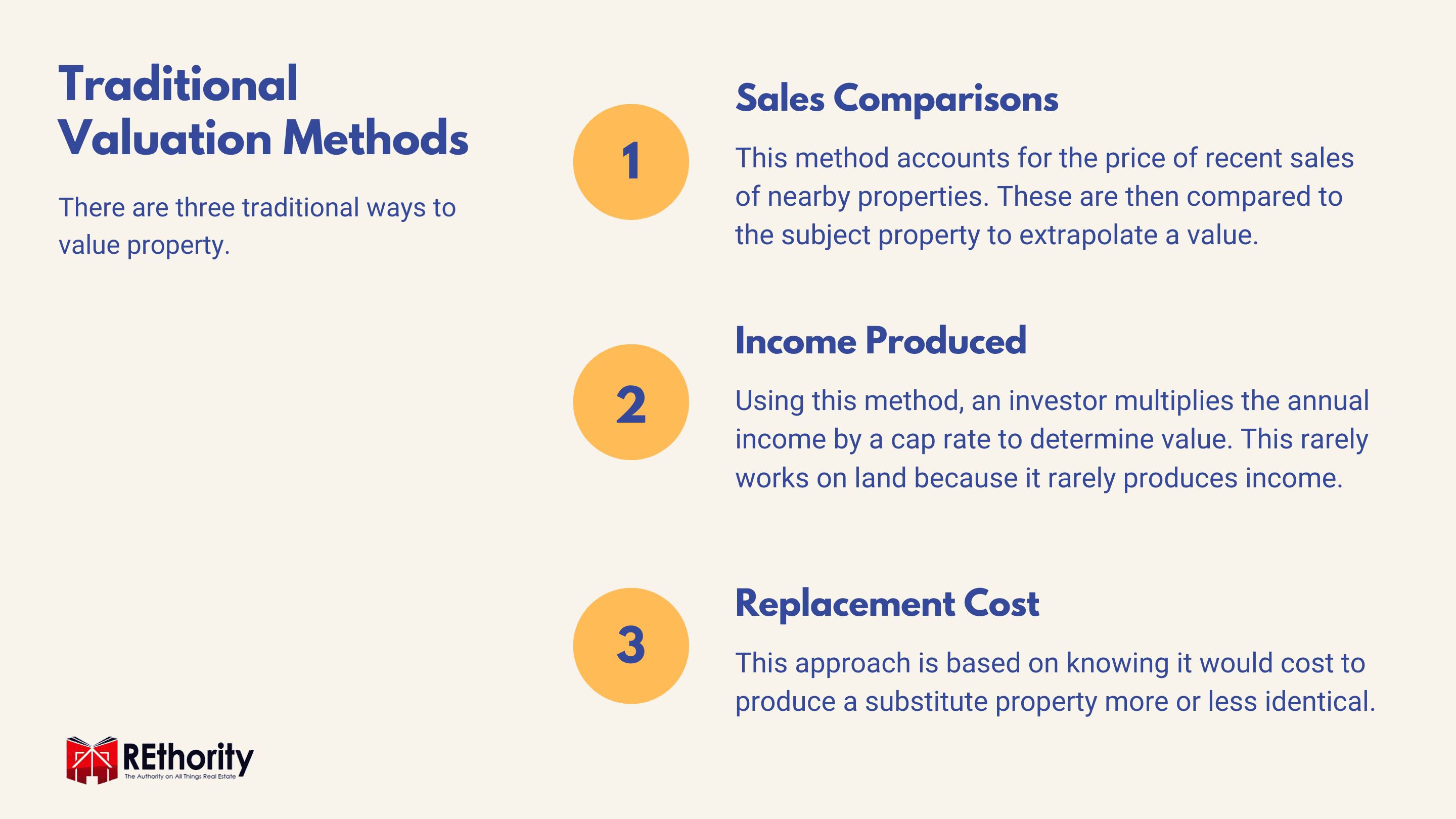
2. Income
The income approach to finding property values works with income-producing properties like rental residences. If real estate hasn’t produced income in the past, future income can be projected based on information from similar income properties.
Much vacant land doesn’t produce any income, however. Only vacant land leased for agricultural or recreational purposes, such as a hunting lease, is likely to generate predictable income. Income is less useful for determining land prices.
3. Cost
This approach is based on knowing how much it would cost to produce a substitute property that is more or less identical. This works reasonably well with buildings because the cost of construction can be determined.
When it comes to vacant land, however, there are no improvements. So the cost valuation method is not very useful.
Hiring an Appraiser
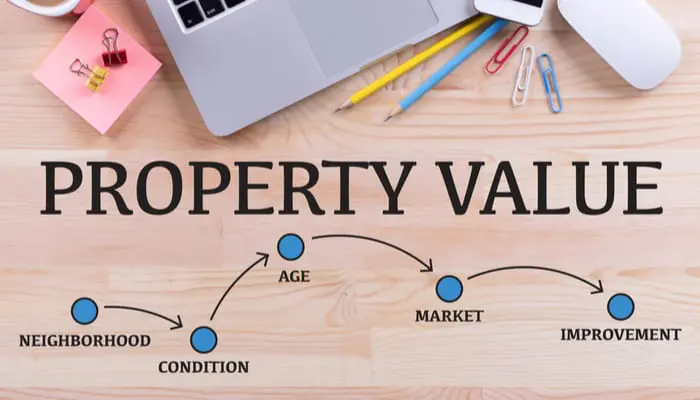
Garagestock/Shutterstock
One way to get a valuation is to hire a professional appraiser. An appraiser will use the above methods where possible. He or she will also look at other factors.
Those may include talking to knowledgeable locals and determining the land’s highest and best use. An appraised valuation is as reliable an assessment as you can get without actually knowing what someone would pay for the property.
It’s what lenders will use to determine how much they’re willing to risk. However, professional appraisers charge fees. Unless and until a financing or sale is in the offing, it’s not cost-effective to pay an appraiser.
Also, different types of vacant land call for different types of appraisers. An appraiser skilled at valuing Texas farmland may not be as accurate when looking at a vacant lot in suburban Chicago.
Best Approaches to Valuing Land
A landowner can still get an idea of what land is worth by gathering some information and doing some analysis. Here are the main ways to learn what land is worth:
Use
Ultimately, what a piece of land can and is likely to be used to determines its worth. This can depend on many factors, including:
- Zoning: Zoning restrictions can have a significant impact. Land zoned for multifamily development may be more valuable than land restricted to one-acre single-family homes.
- Size, shape, and dimensions: If a piece of land is too small or too irregularly shaped for a home site, that will affect its current market value.
- Topography: A lot that is set on a steep hillside might be worth far less than a similar-sized one on flat land.
- Flood risk: Land in a floodplain may have building restrictions or added costs associated with it that could affect its value.
- Exploitable resources: Vacant land may come with valuable mineral rights, water rights, timber, or other natural resources.
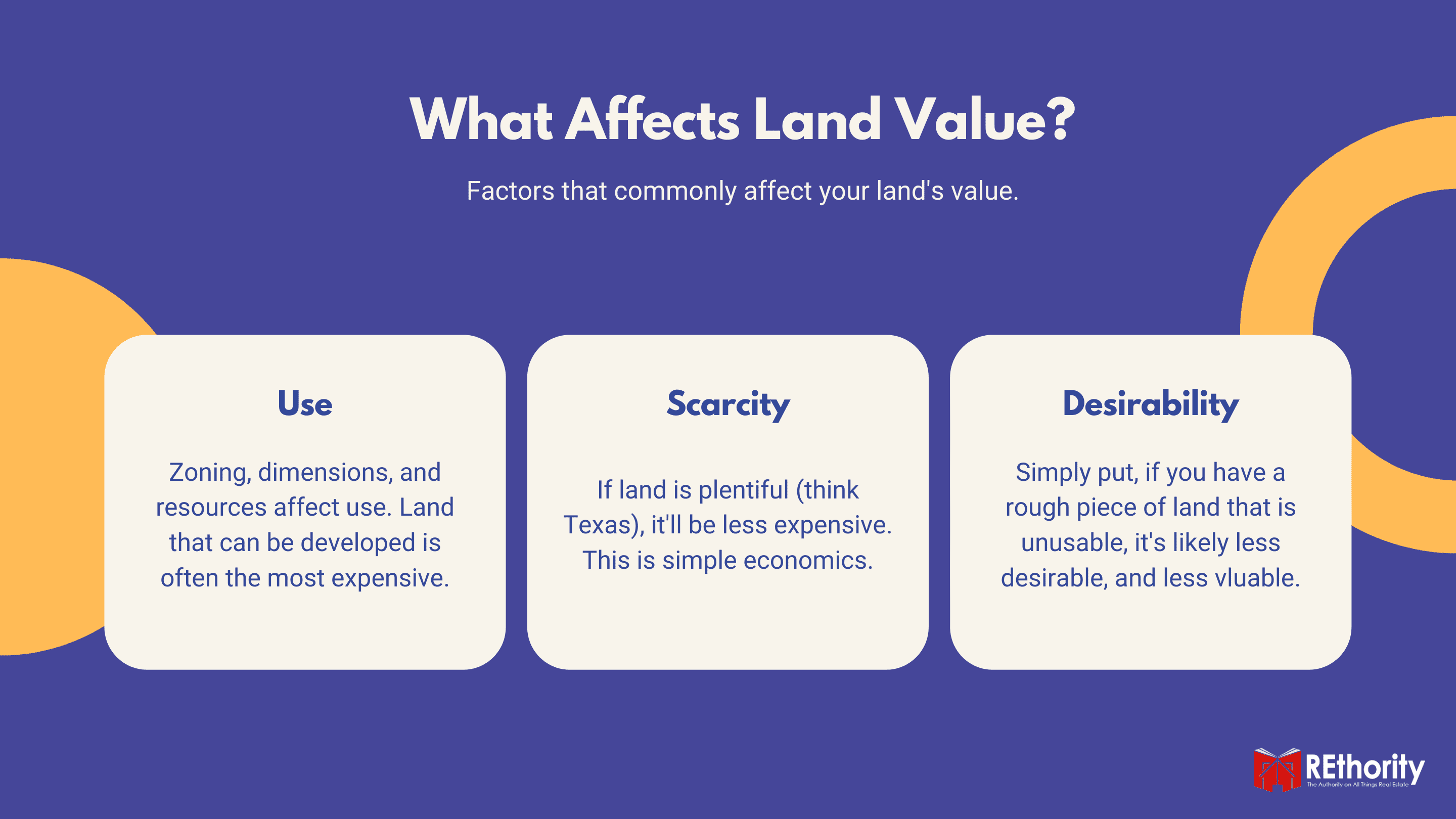
Scarcity
The last unbuilt lot in a fever-hot building market may command a high value. On the other hand, there may be dozens of similar properties available. Then the value of none of them is likely to be high.
So you need to have some idea of the real estate market conditions. It’s also essential to assess how unique or unusual your land is.
Sites such as the local Multiple Listing Service or Zillow can help you see whether similar pieces of land are available. Key factors to use when comparing listings to your property include:
- The number of dwellings that could be built on the site.
- Access to transportation facilities such as rail or highways.
- Frontage on a commercial road, lake, or other assets.
- The direction of population growth and building trends.
Land use and zoning regulations are essential for determining scarcity. Check with the city and zoning commission to make sure of the zoning for the parcel in question.
Desirability
This is the X factor. Desirability can include a host of things that are hard to quantify. They may include:
- Location. How close are employers, schools, and shopping?
- Access. Does it have access to or easements to roadways?
- Utilities. Are they nearby?
- Traffic. An otherwise great home site might be less valuable on a busy road.
- Neighbors. Is it near a high-end housing development? Or a landfill?
- Aesthetics. Does it have a view? Is it wooded?
- Improvements. Is it fenced? Does it have ponds or other amenities?
Desirability may be based as much on a first impression of what the property looks like as anything else. And all of these factors have to be used with a sizable fudge factor.
The fact is, valuing vacant land is not an exact science. Even the most expert appraiser won’t be right all the time.
Knowing what goes into valuing land can help make a valuation exercise more accurate. But the ultimate deciding factor—what someone will pay for it—can’t be determined without actually selling it.
Land Valuation Tools
Some useful tools can help determine the value of land. While some are aimed at investors, they can also be used by landowners.
Price Boss

Image Source: Landspeedtech.com
Price Boss is a CRM that gathers data on land for sale from sources such as Zillow, Landwatch, and Craigslist. It automatically calculates the price per acre and helps suggest offers.
Price Boss comes in two price levels:
- Lite. This does 25 comps per analysis and costs $47 for a one-time payment.
- Pro. This does 500 comps per analysis and automatically gathers comps for a $497 one-time payment.
Price Boss offers a free trial with the Pro version.
Landwatch
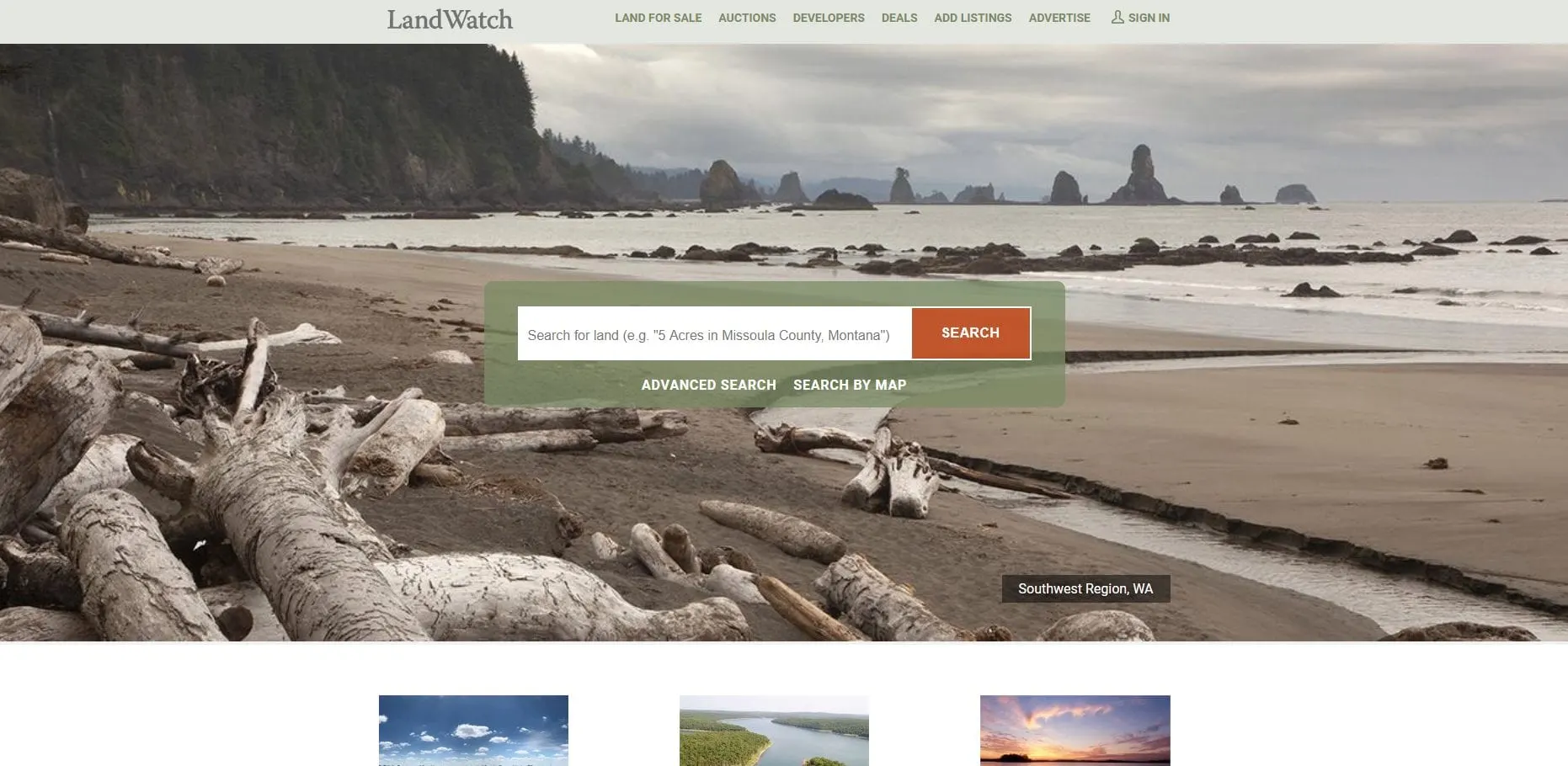
Image Source: Landwatch.com
Landwatch is an online listing site useful for finding land listing companies. Its listings include land for residential and commercial development as well as other uses. Some include vacation home sites, recreation, farming, ranches, timber, and hunting.
Landwatch can be searched for properties in countries, states, cities, and counties. Searches can also specify land type, price, auctions, acreage, use, and more.
So, How Much Is Your Land Worth?
A professional appraiser can provide the most accurate figure for what your land is worth. However, even that will be an estimate, and paying an appraiser isn’t always feasible.
Any landowner can learn the basics of how land is valued, however. First, gain an understanding of your land’s value characteristics and how it compares with other parcels.
Then a useful estimate of what your land is worth is well within reach. Do you know of a better way to find the value of your land? Contact us by email on our “contact us” page!

